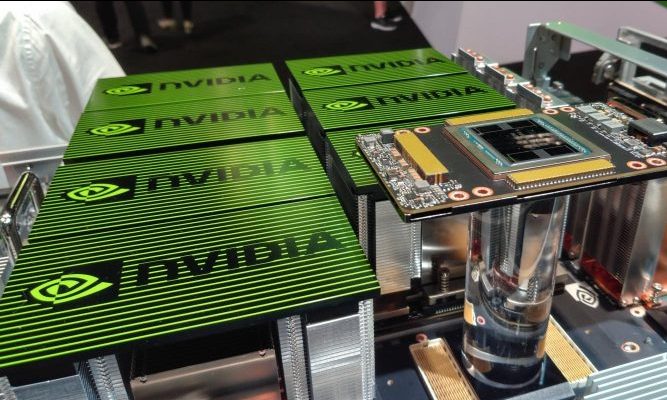Leuven, January 24, 2019 – It may not look spectacular, but its performance certainly is: with their acquisition of an NVIDIA DGX-2™, the University of Antwerp and imec have become the first university in the Benelux to own the latest generation of supercomputer.
This computer has a calculation speed of two petaflops per second,” explains Steven Latré. “One petaflop is 10 to the 15th power, or a quadrillion.”
The University of Antwerp has had a supercomputer – the CalcUA – which has a calculating power of 240 teraflops for several years now. It can perform 240 trillion (1012) ‘floating point operations per second’ (flops), which are calculations like sums or multiplications, and is mainly used for scientific research. Sometimes it is also made available to companies.
The DGX-1, the first version of NVIDIA’s DGX supercomputer, which has a computing power of 960 teraflops, has been used by imec’s City of Things teams since late 2017 for ‘deep learning’ of camera images for smart city cases. For example, the DGX-1 can help researchers understand contexts and pedestrian behaviours on zebra crossings with traffic lights in order to make them safer and more efficient.
In addition to the CalcUA at UAntwerp and the DGX-1 at imec, a new supercomputer will now be installed at IDLab, an imec research group at UAntwerp. Despite its super performance, it is not supersized: the NVIDIA DGX-2™ is no bigger than a small refrigerator.
“We’re going to make enormous strides in terms of processing power”, says Steven Latré, professor of computer science (UAntwerp/imec). “This new computer can handle up to two petaflops of calculations per second. One petaflop amounts to 10 to the 15th power, or a quadrillion. That’s a number we can barely wrap our human heads around. It will be 8.3 times faster than the CalcUA.”
Need for computing power
The new computer is essential for tackling today’s challenges.
Latré: “We’ve now entered the age of artificial intelligence and deep learning. Our researchers constantly need a tremendous amount of computing power. When training new AI systems, they often have to wait several hours to get a result. A good combination of CPUs (central processing units) and GPUs (graphics processing units) is crucial in this regard.”
When it came to actually purchasing this new, unique piece of infrastructure, the University of Antwerp approached Robovision, a Ghent-based AI company.
“The NVIDIA DGX-2™ is the world’s first single server to have a calculation speed of two petaflops. That means its deep-learning processing power outstrips that of 300 conventional computer servers combined. The DGX-2 is also the very first unit to be installed at a university in the Benelux”, says CEO Jonathan Berte.
Fight against malaria
“It is very important that universities and research centres invest in such supercomputers. Pieter Abbeel, a Belgian AI pioneer in Silicon Valley, recently said during his Belgian tour that there is really only one factor limiting today’s race to smarter AI models and assistants, and that’s the performance of the computers available. In places where innovative research is being carried out, the DGX-2™ will prove to be an essential asset. The supercomputer will allow UAntwerp and imec researchers to learn much faster and to make rapid advances in the development and application of artificial intelligence in research, industry and society.”
Several projects involving the NVIDIA DGX-2™ are already in the pipeline at the University of Antwerp. It will be used in the fight against malaria, for example, in collaboration with Robovision.
Berte: “Today, medical staff are still analysing thousands of cells manually, while intelligent algorithms can do the same work in a fraction of a second. More people can now be diagnosed faster and more accurately thanks to artificial intelligence. Robovision makes training these algorithms with the RVAI toolbox up to 250 times faster. Similar experiments conducted in the American government’s research department (NIH) now take a full day, but this waiting time could be reduced to a trip to the coffee machine with Robovision.
Practical information
Wednesday 23 January, 1.30 p.m. to 5 p.m.: Deep Learning Applied Summit
Location: Hof van Liere, UAntwerp Stadscampus (Prinsstraat 13B, 2000 Antwerp)























